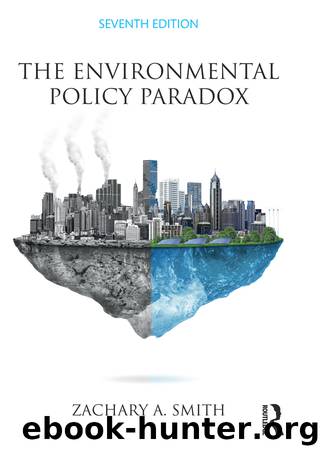The Environmental Policy Paradox by Zachary A. Smith

Author:Zachary A. Smith
Language: eng
Format: epub
Publisher: Routledge
Development of Nuclear Power
The development of nuclear power was thought by many to be the panacea for solving the energy crisis. Nuclear power started with the development and use of the atomic bomb during World War II.41 As the joy over the end of the war mixed with feelings of horror at the power of the unleashed atom, astute politicians realized that warfare and international relations would never be the same.
In the United States, the federal government granted itself a monopoly over nuclear power with the passage of the Atomic Energy Act in 1946. The Atomic Energy Commission (AEC) was established as well as the Joint Committee on Atomic Energy (JCAE) in Congress. The AEC was a unique federal agency. It had total control over nuclear energy development, including ownership of nuclear fuels. It was also entrusted with the sometimes-conflicting role of nuclear power regulator.
The Atomic Energy Act of 1954 gave a boost to commercial production of nuclear power. Private firms would be allowed to own reactors while the government would continue to retain ownership of the nuclear fuels.
This was not sufficient incentive, however, for private enterprise to become involved in a technology with an uncertain future and huge potential liability problems in the event of an accident. In an effort to address the liability issue, Congress, in 1957, passed the Price–Anderson Act, limiting the liability from a nuclear accident of an individual company, and provided government subsidies to cover damage above the liability limits. The Price–Anderson Amendments in 1988 raised the liability limits from $5 million per facility/per incident to $63 million per facility/per incident.42 However, plant operators (or licensees) are not required to pay out more than $10 million in any one year in case of liability under the act.43
Although the Price–Anderson Act removed a major obstacle to commercial nuclear power, there were still inadequate incentives for the private sector to develop nuclear power. In 1963, Congress passed the Private Ownership of Special Nuclear Fuels Act, which would allow private ownership of nuclear materials for nonmilitary purposes. However, it was the environmental problems inherent in coal-fired plants and the great Northeast blackout of 1965 that gave an essential boost to nuclear power. It is ironic that environmental concerns helped to spawn an industry that would turn out to have serious long-term environmental repercussions of a different nature.44
The need for an alternative to polluting coal did not mean there were no organized environmental interest groups in opposition to nuclear power. In fact, the biggest threat to the vitality of the nuclear industry came from the new environmental movement, which recognized the potentially catastrophic impact of a major accident and the disposal problems of nuclear waste. Additionally, nuclear power became associated in many minds with nuclear holocaust. The nuclear age had forced on the world the realization that humankind now had the power to destroy all life on earth.45
The 1973 energy crisis provided the nuclear power industry with an opportunity to promote their program as an alternative to oil and as protection from the whims of foreign oil exporting countries.
Download
This site does not store any files on its server. We only index and link to content provided by other sites. Please contact the content providers to delete copyright contents if any and email us, we'll remove relevant links or contents immediately.
The Secret History by Donna Tartt(19058)
The Social Justice Warrior Handbook by Lisa De Pasquale(12187)
Thirteen Reasons Why by Jay Asher(8894)
This Is How You Lose Her by Junot Diaz(6877)
Weapons of Math Destruction by Cathy O'Neil(6267)
Zero to One by Peter Thiel(5789)
Beartown by Fredrik Backman(5737)
The Myth of the Strong Leader by Archie Brown(5500)
The Fire Next Time by James Baldwin(5432)
How Democracies Die by Steven Levitsky & Daniel Ziblatt(5216)
Promise Me, Dad by Joe Biden(5144)
Stone's Rules by Roger Stone(5081)
A Higher Loyalty: Truth, Lies, and Leadership by James Comey(4954)
100 Deadly Skills by Clint Emerson(4921)
Rise and Kill First by Ronen Bergman(4780)
Secrecy World by Jake Bernstein(4742)
The David Icke Guide to the Global Conspiracy (and how to end it) by David Icke(4709)
The Farm by Tom Rob Smith(4502)
The Doomsday Machine by Daniel Ellsberg(4485)
